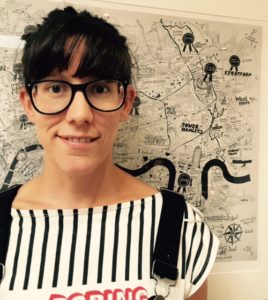 At the beginning of this journey, before I had even started my PhD, when I was only just putting together the potential funding application for my NIHR fellowship, I was asked to estimate how many participants I might be able to recruit to my randomised controlled pilot study. At this point I hadn’t actually finalised the funding application (nowhere near), nor had I got a PhD place, let alone designed the intervention I was planning to trial. All I had to base my numbers on was a pragmatic guess, based on a service I had worked in (in a national central London NHS centre) for all of one year. I was the first SLT to have worked in this memory disorders service, and there seemed to be a fair number of people with PPA being referred. Having checked these numbers with the two other SLT services who had in principle agreed to participate in this theoretical trial, this was then multiplied by three. The two other SLTs also worked in large regional centres. And just to add, I would describe us all as optimistic people.
At the beginning of this journey, before I had even started my PhD, when I was only just putting together the potential funding application for my NIHR fellowship, I was asked to estimate how many participants I might be able to recruit to my randomised controlled pilot study. At this point I hadn’t actually finalised the funding application (nowhere near), nor had I got a PhD place, let alone designed the intervention I was planning to trial. All I had to base my numbers on was a pragmatic guess, based on a service I had worked in (in a national central London NHS centre) for all of one year. I was the first SLT to have worked in this memory disorders service, and there seemed to be a fair number of people with PPA being referred. Having checked these numbers with the two other SLT services who had in principle agreed to participate in this theoretical trial, this was then multiplied by three. The two other SLTs also worked in large regional centres. And just to add, I would describe us all as optimistic people.
Once calculated, these recruitment numbers were used in my funding application, which I was awarded (yay), and thus approximately 9 months after making this calculation I started my PhD. In the first year of my PhD I did some other PhD-y work (a survey, a literature review) and I started my application for ethical approval to conduct the research within the NHS trusts who had, in principle agreed to host the pilot. I used the same numbers I had optimistically calculated a couple of years prior. Then toward the end of year two of my PhD, I received ethical approval (while simultaneously finalising the design of the intervention and doing some ironing out and road testing) and commenced R&D approval within each organisation. At the start of my third year I trained the three NHS sites. Or I tried to. In that time the service I had previously worked for no longer existed in the same form, so no PPA referrals. By this time the SLT at the second NHS trust was about to retire. And the SLT at the third NHS trust was under a lot of pressure, her department having undergone a re-structure. Initially, we only recruited a couple of participants.
So, I embarked on a mission to get more SLTs in new NHS sites on board. I emailed around to a number of SLTs working in dementia and identified three new sites- one as a participant identification centre (PIC) for the first site, the other two as stand-alone sites. Once an ethics amendment and local R&D had been sorted out, as well as training completed, it was nearing the middle of the third year of my PhD. One site was prolific- and recruited a number of participants to the study. The PIC site took longer to set up, lots of creases to iron out. And at the third site, the new neurologist started referring significantly fewer people with PPA. Then one of the SLTs became pregnant and another SLT’s short term contract came to an end and the department struggled to replace her.
So, toward the end of my third year, I added a few more (local London based) sites. This time I contacted local SLTs, anyone who worked with adults, who reported seeing the odd person with PPA. This represents most adult SLT services. I also found that as I disseminated work on my PhD project, a couple of services approached me offering to be added as research sites. Another round of ethics amendments, local R&D applications and training has dominated the first half of the fourth year of my PhD. The momentum is increasing and more people with PPA have been recruited to the study.

Of course not every client would like to participate in a research study, for various reasons. Yet there have been many participants, who have been incredibly generous and interested and excited by the study.
Despite it seeming rather strange to estimate how many participants I might recruit to a study in 3 or 4 years’ time, how else can we plan a study? Thus here are some tips to recruitment of participants in an NHS setting:
- Recruit more professionals at more NHS sites than you think you will need – things change, people change jobs and you may find the sites are unable to participate at some point.
- Monitor your recruitment closely and add more sites when you have a tiny flutter of an idea that you may need more – the paperwork takes so long you may as well get on with it.
- Give the professionals you are working with a thorough training session, and all the materials they need, try to make it as easy as possible to participate in the study.
- Encourage the professionals to think of the study as routine- if one had a cancer diagnosis one wouldn’t be surprised to be offered to participate in a research study, so why not offer a speech and language therapy research study.
- Encourage the professionals you are working with, send them emails updating them on the project, thank them for their help, emphasise that they are an incredibly valuable part of the team.
- Keep in regular touch with the professionals you are working with so they don’t forget about the study. Send Christmas and Easter and summer holiday emails. Try and email every two months or so at least.
- Be available, send them your phone number, so they can call or text or email. Whatever they choose.
- Most importantly. Persevere. Keep going. This is the real NHS and it is worth it.
(Ed: You can also use the NIHR Join Dementia Research service for free [1], you also also listen to our podcast on this topic here [2].)
Author [3]
[3]
Anna Volkmer [4] is a Speech and Language Therapist and NIHR Doctoral Research Fellow working in Language and Cognition, Department of Psychology and Language Sciences, University College London. Anna is researching Speech and language therapy interventions in language led dementia.
You can follow Anna on Twitter Follow @volkmer_anna [5]